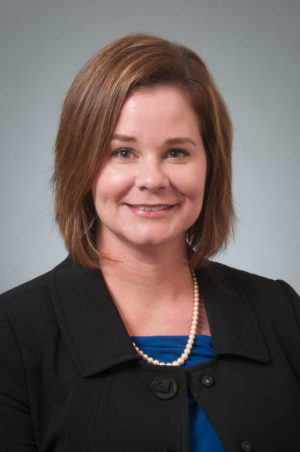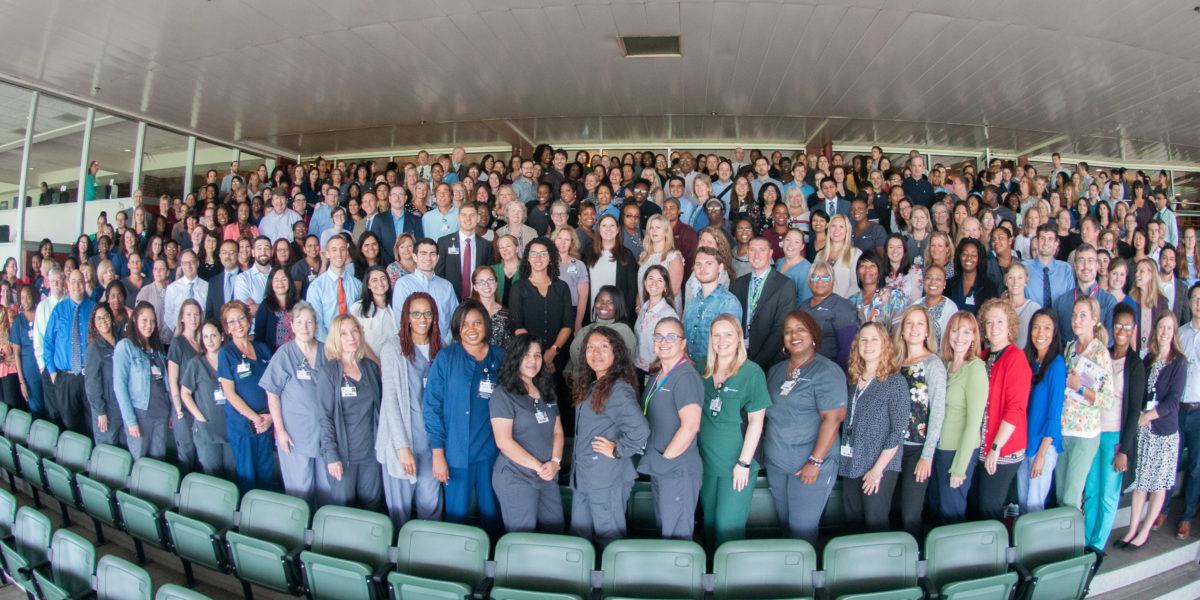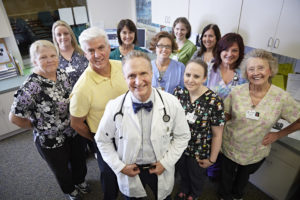It’s not uncommon to spot primary care providers, medical assistants and nurses setting up their workstations and reviewing the patient schedule at 7:30 a.m. But on Sept. 12, the multidisciplinary members of Christiana Care Health System’s primary-care practices weren’t preparing to see patients. Their offices were closed for the morning. Instead, they were attending an unprecedented event in the Delaware Park clubhouse. The purpose: reimagine primary care.

“Those of us in the room today represent the future of Christiana Care,” said Christine Donohue-Henry, M.D., MBA, chief medical officer, Community Care. “The future of health care is the ambulatory side — the outpatient services that are provided in our community.”
The crowd of more than 400 represented all facets of a primary-care practice, from office assistants to behavioral health consultants to clinicians. They collaborated to discuss a health care delivery model that integrates resources across the continuum. The new model is needed as Christiana Care seeks to increase access to primary care through new and expanded primary care locations, digital options, centralized support services and a team-based approach to care.
“There are many people in our community who do not have good health and can’t get the care that they need,” she said. “Many private, primary-care clinicians have retired or gone into concierge practice. Sometimes the wait is four, five and six months for a new patient appointment. We need to grow to care for the patients in our community.”
Meanwhile, health care costs are increasing.
“Primary care is one of the most effective means to manage costs long term,” she said. “If we can get a patient’s diabetes under control, we can hopefully prevent the heart attack and ICU stays 10 years from now. If we have a young mom who is struggling with depression, getting the care she needs has an impact not only on her but also on her family. There’s a lot of good that we can do in primary care.”
Accessible and available
While Christiana Care is growing its physical primary care network in the community, access to primary-care services isn’t limited to bricks and mortar. It includes a phone call with a medical assistant to review bloodwork results or with a triage nurse to manage a child’s fever, Dr. Donohue-Henry said.

Christiana Care will pull some tasks out of the primary-care practice and place them in a centralized support service, which will boost efficiency and allow health care providers to spend more valuable face-to-face time with patients, said Amanda McMullen, Ph.D., vice president, Ambulatory Quality and Safety and Primary Care. The centralized support operation, which is expected to launch in 2019, may handle such responsibilities as referrals and prior authorizations.
A digital strategy is also helping to boost efficiency and increase access. Christiana Care is developing a platform that will let patients schedule appointments online. Primary-care employees will also use an online platform to access information. A dashboard interface will allow practices to view key metrics, such as patient and caregiver satisfaction results and finances.
A team approach to care
To create a better experience for patients and employees, Christiana Care will form “teamlets” within each primary-care practice.
“We were driven by the question: ‘What is an ideal practice going forward?’” Dr. Donohue-Henry said. “Over the long term, a team really is the solution to caring for a large panel of patients.”
Christiana Care already has teams in place in its Independence at Home program. Primary-care practices in Woodstown and Carney’s Point, New Jersey, have patient-focused care teams as part of Comprehensive Primary Care Plus — a public-private partnership between the U.S. Centers for Medicare and Medicaid Services and private insurers.
Each primary-care teamlet will consist of one physician, one advanced-practice clinician — such as a nurse practitioner or physician assistant — one registered nurse and three medical assistants. Leadership roles include a practice manager and clinical leader. In the future, each practice may also have a nursing leader. Among the teamlets’ support services are office assistants, patient service representatives, pharmacy technicians, CareVio care managers and behavioral health consultants.
As opposed to the traditional model that puts a health care provider at the center of the processes, the teamlet model allows the primary-care practice to “share the care,” said Cynthia Griffin, MS, RN, CPHQ, CCM, chief nursing officer, Community Care.
For instance, an RN might handle annual wellness visits while an LPN handles simple wound care and a medical assistant talks with patients about their care plan.
The approach has been successfully tested at Christiana Care’s Smyrna practice as part of the “PACT” or “patient anchored care team”.
“One of the best parts of the model is the weekly meetings attended by all our staff,” said Priyanka Dixit-Patel, M.D. “This is a time for reflection when we reviewed complex patient issues, [and] our data and used the time to do some referral tracking. This allows us to approach patient care in a cohesive manner. We look for ways to improve the care of our patients.”
Primary-care practices are now dedicating one hour a week to population health competencies, which focus on managing disease and encouraging wellness in the community. That time will gradually increase, said Marina Zeltser, M.D., MBA, quality and safety officer for Primary Care and Community Medicine who emphasized the need to make time for training, care standardization and team meetings.
The teamlet model will require additional staff, McMullen said. Recruitment has started and teamlets should be fully staffed in 2020. She urged the crowd to offer feedback throughout the implementation. “You know best what’s working and what’s not working,” she said.
Dr. Donohue-Henry agreed. “The evolution will be a reflection of our learning, adapting and responding.” she said.
Many attendees had a positive reaction to the event. “I love how everybody got together and gave their input,” said Sonja Dallas, a medical assistant.
“It was nice to meet people from other offices,” said Kim George, an office assistant, who is looking forward to being part of a teamlet.
Sarah Schenck, M.D., FACP, clinical director of Practice Transformation for Primary Care, was enthusiastic about the retreat. “This is officially the most exciting day of my career at Christiana Care,” she said. “I have been an advocate of team-based care for years, and this [event] — to me — marks the milestone that we’re on our way.”



